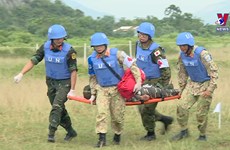Vietnam takes measures to prevent Ebola disease
Prime Minister Nguyen Tan Dung and Deputy Prime Minister Vu Duc Dam on
August 9 had an emergency meeting in Hanoi with related ministries and
agencies to seek ways to prevent Ebola virus disease that is raging
across West Africa.
Prime Minister Nguyen Tan Dung and Deputy Prime Minister Vu Duc Dam on
August 9 had an emergency meeting in Hanoi with related ministries and
agencies to seek ways to prevent Ebola virus disease that is raging
across West Africa.
PM Dung stressed that the most important goal currently is to prevent Ebola from entering Vietnam and ensure the safety of people from the disease.
He asked the Ministry of Health to collaborate closely with the World Health Organisation (WHO) to get thorough understanding of the situation, while updating the community with the developments and well as the danger of the disease.
He urged the ministry to educate people on the transmission method of the disease and ways to protect themselves from being infected.
It is also important to prepare plans of response as well as treatment methods in case Ebola enters Vietnam , he said.
PM Dung also asked for the installation of health observation equipment in all border gates, while taking measures to limit citizens from travelling to affected countries.
In an effort to prevent the disease, the Ministry of Health will ask people from West African countries affected by the Ebola outbreak to sign a medical declaration before entering Vietnam from August 15.
Any person suspected of having come into contact with the virus will be stopped at airports or border gates by quarantine staff, isolated and given medical support.
The ministry reported that as of August 7, Vietnam had not recorded any Ebola cases, but the deadly virus may enter the country through tourists, guest workers coming from or others transiting via West African countries.
Also on August 9, the People’s Committee of the northern boundary province of Lao Cai also issued an emergency direction asking its health sector to step up prevention measure against Ebola, with a focus on health supervision on people entering Vietnam through the Lao Cai International Border Gate.
According to WHO, Ebola is introduced into the human population through close contact with the blood, secretions, organs or other bodily fluids of infected animals.
It then spreads in the community through human-to-human transmission, with infection resulting from direct contact (through broken skin or mucous membranes) with the blood, secretions, organs or other bodily fluids of infected people, and indirect contact with environments contaminated with such fluids.
The disease is a severe acute viral illness often characterised by the sudden onset of fever, intense weakness, muscle pain, headache and sore throat. This is followed by vomiting, diarrhoea, rash, impaired kidney and liver function, and in some cases, both internal and external bleeding.
As yet, no licenced vaccination for Ebola is available.
On August 6, WHO reported Ebola affections were 1,711, with death toll rising to 932, mostly in West African countries of Guinea, Liberia, Nigeria and Sierra Leone.-VNA
PM Dung stressed that the most important goal currently is to prevent Ebola from entering Vietnam and ensure the safety of people from the disease.
He asked the Ministry of Health to collaborate closely with the World Health Organisation (WHO) to get thorough understanding of the situation, while updating the community with the developments and well as the danger of the disease.
He urged the ministry to educate people on the transmission method of the disease and ways to protect themselves from being infected.
It is also important to prepare plans of response as well as treatment methods in case Ebola enters Vietnam , he said.
PM Dung also asked for the installation of health observation equipment in all border gates, while taking measures to limit citizens from travelling to affected countries.
In an effort to prevent the disease, the Ministry of Health will ask people from West African countries affected by the Ebola outbreak to sign a medical declaration before entering Vietnam from August 15.
Any person suspected of having come into contact with the virus will be stopped at airports or border gates by quarantine staff, isolated and given medical support.
The ministry reported that as of August 7, Vietnam had not recorded any Ebola cases, but the deadly virus may enter the country through tourists, guest workers coming from or others transiting via West African countries.
Also on August 9, the People’s Committee of the northern boundary province of Lao Cai also issued an emergency direction asking its health sector to step up prevention measure against Ebola, with a focus on health supervision on people entering Vietnam through the Lao Cai International Border Gate.
According to WHO, Ebola is introduced into the human population through close contact with the blood, secretions, organs or other bodily fluids of infected animals.
It then spreads in the community through human-to-human transmission, with infection resulting from direct contact (through broken skin or mucous membranes) with the blood, secretions, organs or other bodily fluids of infected people, and indirect contact with environments contaminated with such fluids.
The disease is a severe acute viral illness often characterised by the sudden onset of fever, intense weakness, muscle pain, headache and sore throat. This is followed by vomiting, diarrhoea, rash, impaired kidney and liver function, and in some cases, both internal and external bleeding.
As yet, no licenced vaccination for Ebola is available.
On August 6, WHO reported Ebola affections were 1,711, with death toll rising to 932, mostly in West African countries of Guinea, Liberia, Nigeria and Sierra Leone.-VNA













